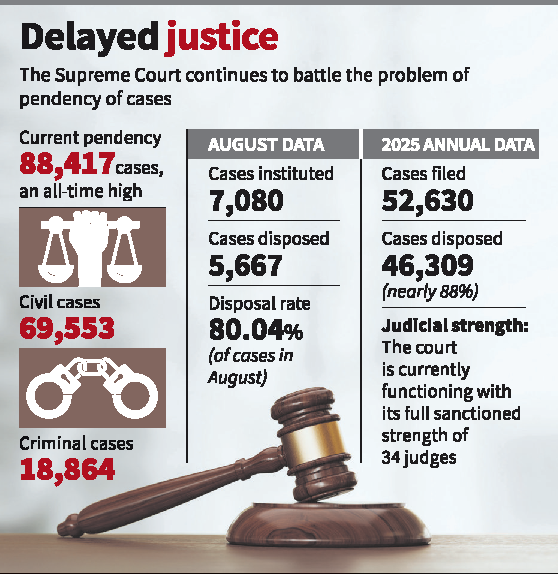Table of Contents
Context: The pendency of cases in the Supreme Court has reached an all-time high of 88,417, even when the court is currently functioning with its full sanctioned judicial strength of 34 judges.
Reasons Behind High Number of Pending Cases
- Frequent Adjournments: Approximately half of the 90 cases listed daily in district and subordinate courts get adjourned.
- Reasons for adjournments include the need for:
- Evidence gathering.
- Legal research.
- Filing motions or awaiting external events affecting the verdict.
- Reasons for adjournments include the need for:
- Complex Judicial Processes: Multiple stages of a case—charge sheet filing, charge framing, evidence presentation, arguments, and judgment—each introduce delays due to structural inefficiencies.
- Examples of delays:
- Prolonged evidence collection by investigation officers.
- Inefficient summons processes by police and public prosecutors.
- Misleading or outdated information in case records (roznama).
- Misplacement of case files, especially in prolonged cases.
- Examples of delays:
- Limited Use of Technology: Many district courts lack adequate video conferencing facilities, hindering modernisation.
- Inadequate Legal Aid: Undertrials from poor socioeconomic backgrounds lack awareness of free legal aid and face issues with the quality of legal assistance.

- High Case Inflow vs Disposal Capacity: Annual inflow remains higher than disposal capacity despite the full strength of judges.
- Eg: Fresh filings (e.g., 7,080 in Aug 2025) consistently outnumber disposals (5,667).
- Structural Limitations: The Supreme Court handles not only constitutional cases but also routine appeals and bail matters.
- It acts as a court of last resort even for small disputes, unlike apex courts in the US/UK.
- Post-Pandemic Pile-Up: COVID years created a backlog surge; pendency has continued to climb since 2023.
- Procedural Inefficiencies: Frequent adjournments, lengthy arguments, and lack of strict case management. Also Digital initiatives like e-filing are not fully mainstreamed.
- Vacancies in Lower Judiciary: Pendency in subordinate courts (over 4.5 crore cases) leads to spillover appeals into higher courts. The Supreme Court ends up shouldering the cumulative
Challenges in Proposed Solutions
- Performance Metrics for Judges: Encouraging judges to prioritise high-disposal cases may sideline sensitive or complex cases.
- Hasty judgments can increase appeals, further burdening the judiciary.
- Engaging Retired Officials for Administrative Tasks: Retired officials may lack sensitivity and familiarity with judicial procedures, potentially creating inefficiencies and unfairness.
- Video Proceedings: Intimidation during virtual hearings as accused are surrounded by jail officers.
- Inability to assess the physical condition or well-being of the accused.
- Loss of crucial rights like meeting family and lawyers confidentially during court appearances.
Key Recommendations
- Structural Reforms in Judicial Processes: Identify and address delays at critical stages like evidence collection, summons issuance, and documentation accuracy.
- Improve case records (roznama) to ensure accurate tracking of case stages.
- Improve Legal Aid Access: Allocate more resources to strengthen free legal aid systems.
- Raise awareness about legal aid among underprivileged undertrials.
- Balanced Approach to Adjournments: Avoid rigid limits on adjournments; evaluate the justification based on case-specific needs.
- Responsible Use of Technology: Enhance video conferencing facilities while safeguarding the rights of undertrials.
- Address issues of intimidation and ensure confidentiality during proceedings.
- Focus on Fair and Speedy Trials: Ensure the pursuit of faster case disposal does not compromise fairness.
- Prioritize systemic solutions over quick fixes like performance metrics or external delegations.
- Resource Allocation: Increase investments in judicial infrastructure, technological modernisation, and human resources to address systemic bottlenecks effectively.
Impacts of Pendency in the Supreme Court
- Access to Justice Denied: Justice delayed amounts to justice denied, eroding public faith in the judiciary.
- Economic Costs: Investor confidence is weakened due to the slow resolution of commercial and arbitration cases.
- World Bank’s Ease of Doing Business indicators have flagged judicial delays as a barrier.
- Increased Workload for Judges: Judges overburdened, leading to stress and reduced quality of judgments.
- Prison Overcrowding: Criminal cases pending for years keep undertrials in jail, worsening overcrowding and human rights issues.
- Federal Tensions: States suffer when major policy or legislative matters remain unresolved (e.g., Governor assent cases, Centre–State disputes).
Way Forward (Committee Recommendations)
- Increase Judge Strength
- Law Commission (1987, 245th Report): Raise judge-population ratio from ~21 per million to at least 50.
- Establish a Constitution Bench Division and Appellate Division (Law Commission, 229th Report).
- Specialised Benches and Courts: Create special courts for commercial, environmental, and tax disputes to reduce the Supreme Court’s burden.
- Process Reforms & Technology: Adopt case management systems, limit adjournments. Strengthen e-Courts Mission Mode Project and expand virtual hearings.
- Institutional Reforms: Filter entry of cases by limiting Special Leave Petitions (SLPs) to matters of constitutional importance.
- Introduce National Court of Appeals (L. Chandrachud Committee) to handle routine appeals.
- Strengthen Lower Judiciary: Fill vacancies in district courts to reduce inflow of appeals.
- All-India Judicial Service (AIJS) to ensure uniform quality and quicker recruitment.


 Navigating Uncharted Waters: What Next f...
Navigating Uncharted Waters: What Next f...
 Astronaut Reentry Explained: How Spacecr...
Astronaut Reentry Explained: How Spacecr...
 Missile Interceptors Explained: Role in ...
Missile Interceptors Explained: Role in ...




















